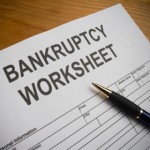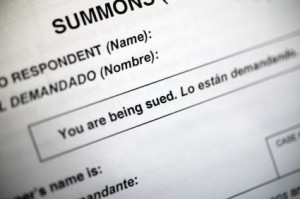By Justin Pope AP
The misfortunes that brought schoolteachers Devin and Sarah Stang and their four young children to bankruptcy — and the loss of their house and a car in the process — were their own unique story.
They bought the house at just the wrong time. There were heavy medical expenses when, at five months pregnant, she delivered stillborn twins. And their money woes go back further: When Sarah’s college softball team pressured her to drop classes she wanted to take, she quit, lost her scholarship and had to make up the difference with loans. Devin, too, borrowed to get a master’s degree. Then they struggled amid school layoffs near their Sandusky, Ohio, home.
Now, the Stangs just want a truly clean slate, financially. But even the ordeal of bankruptcy won’t give it to them, and the reason is a common one: Much of their debt comes from private student loans.
Virtually any other kind of debt — including medical bills, mortgage, credit cards and car loans, even gambling losses— can be discharged in bankruptcy, allowing the “honest but unlucky” a chance to restore their footing through an arduous restructuring overseen by a court.
But under a 2005 law passed by Congress to protect lenders, private student loans fall under the same nearly-impossible-to-clear category as child support payments and criminal fines.
“It’s a huge part of why the younger generations are here now,” said the Stangs’ bankruptcy lawyer, Matthew Barrett, whose busy office in Amherst, west of Cleveland, belies stories about the improving economy. He estimates half his clients have problems with student debt.
To advocates for student borrowers, the law is infuriating, counter-productive and — if intended to ensure lenders would be willing to make loans to students— demonstrably unnecessary. They see changing it as among the most effective, and least costly, ways to help those most seriously burdened by student debt, without giving a break to those for whom it’s manageable.
Yet despite a voluble national conversation on student debt, the issue has gotten comparatively little attention.
At stops in three swing states this week, President Barack Obama is calling on Congress to head off a scheduled doubling in federal Stafford loan rates, from 3.4 percent to 6.8 percent. Changing that law could save more than 7 million new borrowers on average $1,000 a year, according to the White House. But this across-the-board benefit for current college students would do nothing for older borrowers already in trouble.
Acting without Congress, the Obama administration has implemented a series of protections for those pressed to pay back federal loans, such as income-based repayment and a public-service loan forgiveness program — steps lauded by advocates for borrowers.
However, the president appears never to have directly addressed a proposal by Sen. Richard Durbin, D-Illinois, to overturn the 2005 law on private loans. Treasury Secretary Timothy Geithner recently told Durbin the dischargeability proposal had “some merit” and that the administration wanted to work with him to expand the protections it has implemented for federal student loans into the private market. Regardless, the bill has little chance of passing the divided Congress in an election year.
“There’s a special circle of bankruptcy hell for these kinds of debts,” said Rich Williams, higher education advocate with the group US PIRG, which lobbies on student loan issues. “It’s not that students are asking for extra protections. We’re asking for the same protections entitled to every other form of consumer debt.”
The Federal Reserve Bank of New York estimates 37 million Americans have student loan debt, totaling $870 billion. The average balance is around $23,000 (though that partly reflects a relatively small number of very large balances; the median is $12,800). Only 39 percent are paying down balances. An estimated 5.4 million borrowers have at least one student loan account past due.
Roughly 85 percent of outstanding student loan debt is owed to the federal government. The remaining 15 percent that’s counted as private student debt is owed to various non-federal lenders, ranging from banks to loan companies like Sallie Mae Corp. to non-profits and state-affiliated agencies (under the Durbin bill, loans from any government-funded entity still wouldn’t be dischargeable, only those from truly private lenders).
Generally, it’s these private loans that bring borrowers to the door of bankruptcy lawyers like Barrett. Private student loans often lack the protections of federal ones, and have rates that typically start higher and can shoot up. A recent survey of bankruptcy attorneys found 81 percent reporting more clients with student debt in recent years, and roughly half reporting a significant increase.
Barrett says he’s seeing more recent college graduates who couldn’t get a job after graduation or who, if they did, faced garnishment of entry-level wages.
Before the 2005 law passed, lenders would “try to work with (borrowers) on a payment plan,” Barrett says. “They had the threat, if we don’t make it so this person can afford to live and eat and get to work and dress for work, then they’re going to file for a bankruptcy plan and we’re going to get hit.
“Now, they’ll hit you with a garnishment — and if you can’t make ends meet, tough.”
Private lenders haven’t always enjoyed a spot at the front of the line of bankruptcy creditors.
Until 1976, all education loans were dischargeable in bankruptcy. That year Congress began requiring borrowers to wait at least five years before they could discharge federal student loans. Since 1998, borrowers have been unable ever to discharge federal student loans, and in 2005 the then-Republican-controlled Congress made private loans almost impossible to discharge. Essentially, borrowers must prove they can’t repay and will never be able to, but the standard is vague. And litigating in bankruptcy court may be impossible financially for someone in those circumstances.
With federal loans, the concern was that making it too easy to walk away from debts would put taxpayer dollars at risk.
With private loans, the lender protections were justified by fears that otherwise lenders wouldn’t extend students the capital they needed to cover tuition bills. Student loans offer no security or collateral. Lenders are betting on a borrower’s education to produce future earnings. Put differently, a bank can repossess your car but not your brain.
Changing the law “would force our members to raise borrower rates or elevate their already strict underwriting standards and essentially make it harder to make the loans,” said a spokeswoman for the Education Finance Council, which represents nonprofit and state-based providers of non-federal loans, in a statement issued on behalf of president Vince Sampson. A Moody’s report also suggested younger student borrowers might be especially tempted by an easier bankruptcy filing, not appreciating the long-term credit damage.
But such arguments swim upstream against a lot of historical data.
Before 1976, when student loans were dischargeable in bankruptcy, there’s little evidence borrowers abused the practice. A federal study from that time estimated less than 1 percent of all matured student loans were discharged in bankruptcy.
Experts like Deanne Loonin of the National Consumer Law Center say bankruptcy is demoralizing, humiliating and difficult, and nobody undertakes it lightly.
“I wasn’t raised to say, ‘I’ll go file bankruptcy,’” said Devin Stang, who is 41. The family’s student debt totals $25,000 in federal loans and about $37,000 in private ones, much of it from taking required continuing education credits to keep up their teaching licenses and job prospects at a time of widespread layoffs.
Surrendering one of their two cars in bankruptcy will limit the Stangs’ work options, Barrett says. And digging out will be even harder because, even after their other debts are clear, the private student lenders could garnishee up to 25 percent of wages.
If they could discharge their private loans in the same manner as credit card debts, “away we’d go on our lives,” Stang said.
There’s also little evidence that changing the law would affect the availability of private student loans. In fact, private student lending was expanding rapidly before 2005, when the loans were dischargeable. Then Congress awarded lenders stronger collection powers — but private student lending fell by two-thirds in just a few years, coinciding with the broader credit crunch.
A leading financial aid expert, Mark Kantrowitz of the website Finaid.org, doesn’t buy the lenders’ argument. He says changing the law might slightly increase fees, but lenders make their decisions based on credit scores and macro-economic factors.
Al Lord, the CEO of Sallie Mae., the largest private lender, which originated $2.7 billion in education loans last year, has predicted changing the law would affect the availability of credit for young people. But he said in a 2010 earnings call that the financial impact on Sallie Mae would be “small” and “not particular troublesome,” in part because almost all its new loans — 85 percent at the time — have co-borrowers.
In a statement, Sallie Mae said the company would support reforms allowing students who have made a “good-faith effort” for five to seven years to discharge student loans in bankruptcy, but specified it would want the reform to apply to both federal and private loans (there’s no proposal on the table to make federal loans dischargeable).
Even if changing the law did make private loans disappear, some advocates think that wouldn’t be so bad.
In fact, new lending has already fallen sharply recently, and it hasn’t kept people out of college; enrollment is way up. Students who might have gotten private loans five years ago, but can’t now, are apparently choosing less expensive schools or borrowing more of what they need from the federal government, which accounts for more than 90 percent of new loan volume now.
A study by the Project on Student Debt, a foundation-supported research group, found that half of students who took out private loans in 2007-2008 failed to borrow their maximum eligibility in federal Stafford loans. Those students could have — and almost certainly should have — borrowed more from Washington first (undergraduates can cumulatively borrow up to $31,000 in federal Stafford loans, and in some cases, as much as $57,500). Now, they’re doing so.
Finally, if the spigot of private loans cut off, it might temper college cost increases. Colleges would find it harder to get away with charging more than what students can borrow from the government.
“These private loans are toxic,” said Williams, of the student advocacy group. If students still can’t afford a college without one, he said, they should probably consider another college.




